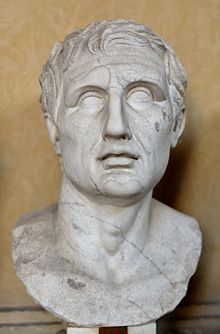 Menander (/məˈnændər/; Greek: Μένανδρος, Menandros; c. 342/41 – c. 290 BC) was a Greek dramatist and the best-known representative of Athenian New Comedy.[1] He wrote 108 comedies[2] and took the prize at the Lenaia festival eight times.[3] His record at the City Dionysia is unknown but may well have been similarly spectacular.
Menander (/məˈnændər/; Greek: Μένανδρος, Menandros; c. 342/41 – c. 290 BC) was a Greek dramatist and the best-known representative of Athenian New Comedy.[1] He wrote 108 comedies[2] and took the prize at the Lenaia festival eight times.[3] His record at the City Dionysia is unknown but may well have been similarly spectacular.
One of the most popular writers of antiquity, his work was lost during the Middle Ages and is known in modernity in highly fragmentary form, much of which was discovered in the 20th century. Only one play, Dyskolos, has survived almost entirely.
-----------------------------------------------------------------------------------------------------------
Dyskolos (Greek: Δύσκολος, pronounced [dýskolos], translated as The Grouch, The Misanthrope, The Curmudgeon, The Bad-tempered Man or Old Cantankerous) is an Ancient Greek comedy by Menander, the only one of his plays, and of the whole New Comedy, that has survived in almost complete form.[1] It was first presented at the Lenaian festival in 317–16 BC, where it won Menander the first-place prize. It was long known only through fragmentary quotations; but a papyrus manuscript of the nearly complete Dyskolos, dating to the 3rd century, was recovered in Egypt in 1952 and forms part of the Bodmer Papyri.
No comments:
Post a Comment